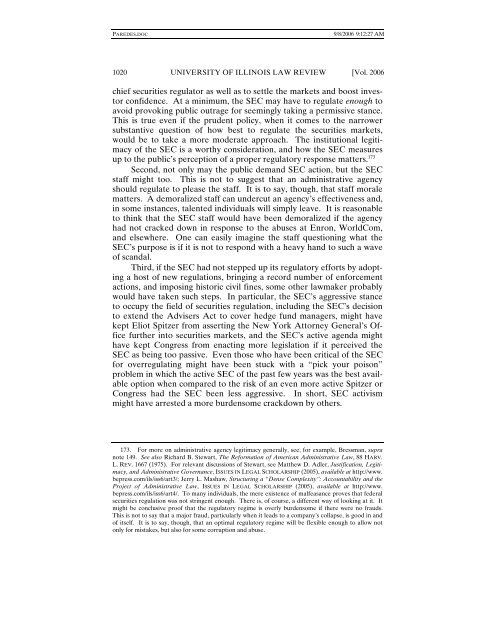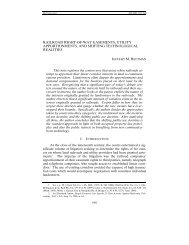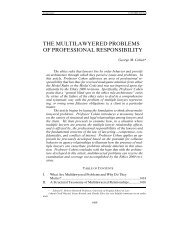on the decision to regulate hedge funds - University of Illinois Law ...
on the decision to regulate hedge funds - University of Illinois Law ...
on the decision to regulate hedge funds - University of Illinois Law ...
Create successful ePaper yourself
Turn your PDF publications into a flip-book with our unique Google optimized e-Paper software.
PAREDES.DOC<br />
9/8/2006 9:12:27 AM<br />
1020 UNIVERSITY OF ILLINOIS LAW REVIEW [Vol. 2006<br />
chief securities regula<strong>to</strong>r as well as <strong>to</strong> settle <strong>the</strong> markets and boost inves<strong>to</strong>r<br />
c<strong>on</strong>fidence. At a minimum, <strong>the</strong> SEC may have <strong>to</strong> <strong>regulate</strong> enough <strong>to</strong><br />
avoid provoking public outrage for seemingly taking a permissive stance.<br />
This is true even if <strong>the</strong> prudent policy, when it comes <strong>to</strong> <strong>the</strong> narrower<br />
substantive questi<strong>on</strong> <strong>of</strong> how best <strong>to</strong> <strong>regulate</strong> <strong>the</strong> securities markets,<br />
would be <strong>to</strong> take a more moderate approach. The instituti<strong>on</strong>al legitimacy<br />
<strong>of</strong> <strong>the</strong> SEC is a worthy c<strong>on</strong>siderati<strong>on</strong>, and how <strong>the</strong> SEC measures<br />
up <strong>to</strong> <strong>the</strong> public’s percepti<strong>on</strong> <strong>of</strong> a proper regula<strong>to</strong>ry resp<strong>on</strong>se matters. 173<br />
Sec<strong>on</strong>d, not <strong>on</strong>ly may <strong>the</strong> public demand SEC acti<strong>on</strong>, but <strong>the</strong> SEC<br />
staff might <strong>to</strong>o. This is not <strong>to</strong> suggest that an administrative agency<br />
should <strong>regulate</strong> <strong>to</strong> please <strong>the</strong> staff. It is <strong>to</strong> say, though, that staff morale<br />
matters. A demoralized staff can undercut an agency’s effectiveness and,<br />
in some instances, talented individuals will simply leave. It is reas<strong>on</strong>able<br />
<strong>to</strong> think that <strong>the</strong> SEC staff would have been demoralized if <strong>the</strong> agency<br />
had not cracked down in resp<strong>on</strong>se <strong>to</strong> <strong>the</strong> abuses at Enr<strong>on</strong>, WorldCom,<br />
and elsewhere. One can easily imagine <strong>the</strong> staff questi<strong>on</strong>ing what <strong>the</strong><br />
SEC’s purpose is if it is not <strong>to</strong> resp<strong>on</strong>d with a heavy hand <strong>to</strong> such a wave<br />
<strong>of</strong> scandal.<br />
Third, if <strong>the</strong> SEC had not stepped up its regula<strong>to</strong>ry efforts by adopting<br />
a host <strong>of</strong> new regulati<strong>on</strong>s, bringing a record number <strong>of</strong> enforcement<br />
acti<strong>on</strong>s, and imposing his<strong>to</strong>ric civil fines, some o<strong>the</strong>r lawmaker probably<br />
would have taken such steps. In particular, <strong>the</strong> SEC’s aggressive stance<br />
<strong>to</strong> occupy <strong>the</strong> field <strong>of</strong> securities regulati<strong>on</strong>, including <strong>the</strong> SEC’s decisi<strong>on</strong><br />
<strong>to</strong> extend <strong>the</strong> Advisers Act <strong>to</strong> cover <strong>hedge</strong> fund managers, might have<br />
kept Eliot Spitzer from asserting <strong>the</strong> New York At<strong>to</strong>rney General’s Office<br />
fur<strong>the</strong>r in<strong>to</strong> securities markets, and <strong>the</strong> SEC’s active agenda might<br />
have kept C<strong>on</strong>gress from enacting more legislati<strong>on</strong> if it perceived <strong>the</strong><br />
SEC as being <strong>to</strong>o passive. Even those who have been critical <strong>of</strong> <strong>the</strong> SEC<br />
for overregulating might have been stuck with a “pick your pois<strong>on</strong>”<br />
problem in which <strong>the</strong> active SEC <strong>of</strong> <strong>the</strong> past few years was <strong>the</strong> best available<br />
opti<strong>on</strong> when compared <strong>to</strong> <strong>the</strong> risk <strong>of</strong> an even more active Spitzer or<br />
C<strong>on</strong>gress had <strong>the</strong> SEC been less aggressive. In short, SEC activism<br />
might have arrested a more burdensome crackdown by o<strong>the</strong>rs.<br />
173. For more <strong>on</strong> administrative agency legitimacy generally, see, for example, Bressman, supra<br />
note 149. See also Richard B. Stewart, The Reformati<strong>on</strong> <strong>of</strong> American Administrative <strong>Law</strong>, 88 HARV.<br />
L. REV. 1667 (1975). For relevant discussi<strong>on</strong>s <strong>of</strong> Stewart, see Mat<strong>the</strong>w D. Adler, Justificati<strong>on</strong>, Legitimacy,<br />
and Administrative Governance, ISSUES IN LEGAL SCHOLARSHIP (2005), available at http://www.<br />
bepress.com/ils/iss6/art3/; Jerry L. Mashaw, Structuring a “Dense Complexity”: Accountability and <strong>the</strong><br />
Project <strong>of</strong> Administrative <strong>Law</strong>, ISSUES IN LEGAL SCHOLARSHIP (2005), available at http://www.<br />
bepress.com/ils/iss6/art4/. To many individuals, <strong>the</strong> mere existence <strong>of</strong> malfeasance proves that federal<br />
securities regulati<strong>on</strong> was not stringent enough. There is, <strong>of</strong> course, a different way <strong>of</strong> looking at it. It<br />
might be c<strong>on</strong>clusive pro<strong>of</strong> that <strong>the</strong> regula<strong>to</strong>ry regime is overly burdensome if <strong>the</strong>re were no frauds.<br />
This is not <strong>to</strong> say that a major fraud, particularly when it leads <strong>to</strong> a company’s collapse, is good in and<br />
<strong>of</strong> itself. It is <strong>to</strong> say, though, that an optimal regula<strong>to</strong>ry regime will be flexible enough <strong>to</strong> allow not<br />
<strong>on</strong>ly for mistakes, but also for some corrupti<strong>on</strong> and abuse.




